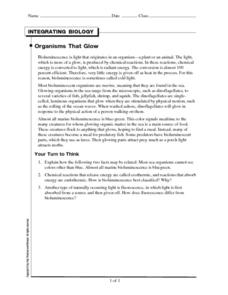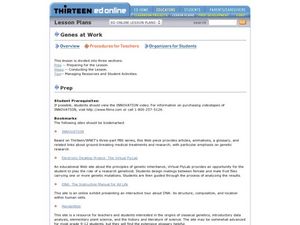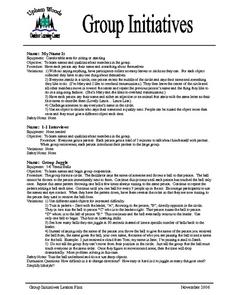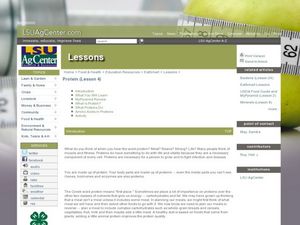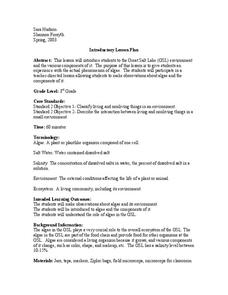Curated OER
Discovering the Forgotten Kingdom Protista
Protists, like algae and mold, are sometimes overlooked for classroom study, but they are astonishing in their diversity and importance.
Curated OER
Organisms that Glow
In this bioluminescence worksheet, students read about various organisms that glow on land and in the sea. They answer three critical thinking questions after reading about these chemical reactions.
Curated OER
Build a Polyp
Students research coral polyps. In this coral polyps instructional activity, students discover the anatomy of a coral polyp and how they feed. Students create an edible coral polyp model.
Curated OER
Genes at Work
Students explore and discuss genetics stories and answer questions about genetic outcomes of offspring. In this genetics lesson, students read genetics stories on a web site. Students use a chart to answer questions regarding the...
Curated OER
Foods for Better Health
Students define biotechnology and discuss the economic impact of biotechnology. They also describe what a 1015 onion and a slow-softening tomato are and how they are produced. They examine the safety of genetically-engineered or altered...
Curated OER
Sponges and Cnidarian Crossword Puzzle
For this marine science worksheet, students complete a crossword puzzle with 32 questions on sponges and cnidarian. They identify the different characteristics of sponges and cnidarian.
Curated OER
The Life Cycle of a Flowering Plant
In this flowering plant worksheet, students will review vocabulary words associated with the life cycle of flowering plants. This worksheet has 7 matching and 3 short answer questions.
Curated OER
Meat, Poultry, Fish, Eggs: Constructing and Maintaining
Students investigate meat as a source that provides protein, iron and nutrients in the diet. They identify types of meat and their sources, complete a market survey, conduct a fried egg experiment, and prepare various recipes that...
Curated OER
Group Initiatives
Students explore the names and qualities about members in the group. They each say their name and something about themselves. Students gather around in a circle. They listen to the teacher as he or she says the name of someone and throws...
Curated OER
The Beagle Brigade
Students brainstorm how to handle conflict scenario. In this character education activity, students read a story and respond as to how the characters should handle the conflict. Students examines feelings of characters and the choices...
Curated OER
Shells
Sixth graders label diagrams of the 6 different classes of mollusks and explain the meaning of the labeled terms. They identify 8 common New Haven shells. They organize their own shell collection during this series of lessons.
Curated OER
Discovering Owls
Students are introduced to different types of owls and owl pellets. They list several adaptations that benefit the owls. Students identify the various species of owl that live in Wisconsin. Students discuss owl pellets and identify the...
Curated OER
What Is A Fossil?
In this fossils learning exercise, students read 13 clues pertaining to fossils. Students fit their answers in a crossword puzzle. There is no word bank.
Curated OER
Fossil Impressions of Ancient Life
Students make a mold using Plaster of Paris and then make a cast using that same mold. They pick a fossil and describe how it looks. They write a fictionalized story about its life, or burial. (
Curated OER
The Three Worm Phyla
Ninth graders examine the three worm phyla. For this classification lesson, 9th graders observe, compare and contrast the planarian, tapeworm, and fluke.
Curated OER
COMMON KINDS OF INSECTS
Students will recognize and name three common insects.1. Share background information with students. 2. Provide students with the "bug body" puzzle pages, and have them cut the puzzles out.1. Share background information with students....
Curated OER
CLOTHESLINE SLEUTH
Young scholars will trace origins of various forms of clothing to their agricultural sources.String a cotton cord across the top of a blackboard to resemble a clothesline. 2. Bring a variety of clothing articles to class made from a...
Curated OER
The Energy of Life in Zebrafish
Students study the stages of development of an unknown organism. In this zebrafish lesson, students examine and collect data as they use microscopes to view a zebrafish embryo.
Curated OER
Life Processes and Water
Students examine the function and nature of water as it effects all living things.
Curated OER
Protein
Students examine protein, what it is and how it functions in the body. In this protein lesson students study the food pyramid, what a protein is and what it does.
Curated OER
LISTENING TO DIRECTIONS
Students view farm objects or products made from farm animals and follow the oral instructions given by the teacher. They are given worksheets, there are three sets of directions for the one worksheet. Students worksheets have everything...
Curated OER
Wandering Wild-oats
Students observe wild-oat seeds. In this biology lesson, students watch how wild-oat seeds react to moisture and draw conclusions and make predictions.
Curated OER
Great Salt Lake
Third graders are introduced to the Great Salt Lake (GSL) environment and the various components of it. They make observations about algae and its environment and discuss why it is considered a living organism and various components of...



